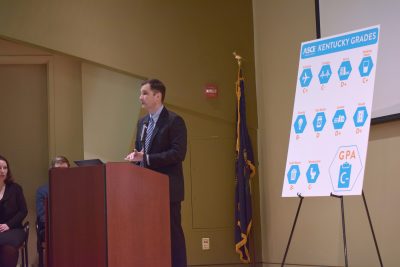The ASCE Kentucky Section released its 2019 Report Card for Kentucky’s Infrastructure, giving the state a “C-.” Civil engineers examined the state’s aviation (C+), bridges (C-), dams (D+), drinking water (C+), energy (B-), hazardous waste (D), levees (D+), roads (D+), solid waste (B-), and wastewater (C-).The Report Card was released at a press conference in Frankfort, KY. Guest speakers included State Rep. Walker Thomas (R-8), who is also the Vice Chair of the House Transportation Committee; Andy Barber, State Highway Engineer with the Kentucky Transportation Cabinet; Peter T. Goodmann, Director of the Kentucky Division of Water; and Donna McNeil, Executive Director of the Kentucky Infrastructure Authority.
The Kentucky surface transportation categories, roads and bridges, saw slight increases in the report, thanks to the implementation of Governor Bevin’s Strategic Highway Investment Formula for Tomorrow (SHIFT) evaluation and scoring system. In addition, the Kentucky Transportation Cabinet (KYTC) recently instituted the Bridging Kentucky program, which will restore more than 1,000 state, county and municipal bridges across Kentucky’s 120 counties between 2018 and 2024. These repairs will add at least 30 years of life to most of these bridges, on top of construction for bridge replacement, which would provide at least 75 years of useful life. Kentucky has already made some incremental progress in reducing the number of structurally deficient bridges throughout the state. In 2011, nearly 9.25 percent of all bridges in Kentucky were structurally deficient; by 2017, 7.77 percent were structurally deficient.
Kentucky’s rural communities require significant funding to ensure their residents have access to clean drinking water and to address existing aging water and wastewater infrastructure systems. Even though Kentucky’s water service level is one of the highest in the United States, more than an estimated 100,000 residents are still without access to a public drinking water supply. Access to wastewater treatment facilities is a significant issue for many Kentucky communities. The pipelines that send wastewater to treatment plants are more than 70 years old, and 40 percent of Kentuckians do not have access to water treatment plants, relying on septic tanks or other private systems, the condition of which is generally unknown.
Sitting at one of the lowest grades in the Report Card at a “D” was hazardous waste, which is defined as any liquid, solid, contained gas, or sludge that pose a serious threat to human health and environment. Kentucky projected $1.6 billion in remedial costs, and there are hundreds of old or abandoned waste sites that still pose threats to the environment and public health.
Other notable findings in the report include:
- Kentucky airports have a total economic impact of nearly $15 billion annually, yielding nearly 115,000 jobs. Cincinnati/Northern Kentucky and Louisville International Airports account for more than 83 percent, or approximately $12.5 billion, of the total economic impact annually.
- The current operating budget for the Dam Safety section of the Division of Water is $529,490 annually, which is one-third of the budget eight years ago.
- All of Kentucky’s levees are protecting more than 306,000 lives and $46.6 billion in property, including hospitals; universities; major manufacturing facilities; critical utilities such as electric power, water and wastewater plants and densely populated metropolitan areas.
- KYTC recently identified $6 billion in unfunded construction projects, which would require an additional $490 million per year to address.
In addition to an assessment of the state’s infrastructure systems, the Report Card for Kentucky’s Infrastructure also offers many solutions to address the state’s infrastructure needs and raise Kentucky’s grade:
- Prioritize investment in the state’s infrastructure even during tight budget cycles by strategically working together with state legislators, agencies, municipalities, business owners, citizens and subject matter experts.
- Invest in Kentucky’s multimodal freight network to retain the state’s competitive advantage while preparing for future growth and changes and provide robust investment for intermodal connections and bottlenecks in the network.
- Increase the Passenger Facility Charge (PFC) cap, which would help Kentucky airports access additional capital to support and improve the state’s aviation infrastructure.
- Support the submitted highway investment SHIFT formula used in the development of the six-year 2018 Highway Plan and determine sustainable, long-term funding to fully address the deficiencies that remain in the state’s transportation network.
- Coordinate with rural communities on finding viable funding, which will allow them to invest in critical infrastructure even with a limited population from which to generate revenue.
A full copy of the Report Card for Kentucky’s Infrastructure is available at InfrastructureReportCard.org/Kentucky.





































